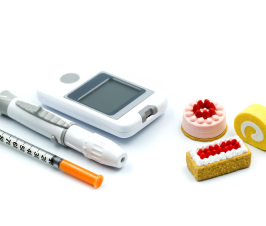Dr. Richard Maurer, ND
@DrRichardMaurer
Short Intense Workouts Reverse Diabetes And Standard Care Makes It Worse
I come from a family of long distance runners—I am also from a family prone to type 2 diabetes. About ten years ago, I was shocked to find that sustained endurance exercise was not correcting my high blood sugar and in fact, blood test results indicated my cardiac health was not so good. That was then and this is now. And this recent study adds to the body of evidence showing that a different kind of exercise works.1
Enter high-intensity-interval-training (HIIT). This study included men and women, average age of sixty, with a diagnosis of type 2 diabetes within the prior 3-6 years. They were divided to follow either the “standard of care” of exercise for diabetics, or a 20-30-minute interval workout with strenuous resistance mixed in, three-days-per-week for twelve weeks.
The pre and post measurements included cardiac muscle structure via MRI, metabolic blood tests and body fat. The results display benefits similar to many other studies that introduce strenuous exercise for people with insulin resistance. Less body fat, fatty liver significantly reduced and blood sugars dropped. But this study, with the MRI analysis, indicates that cardiac structure and function both significantly improved in the HIIT group.
The Blood Code Fitness Principles to Correct Insulin Resistance
1) Exercise on an empty stomach.
2) Exercise strenuously and vigorously.
3) Engage many muscle groups whenever possible.
4) Vary your heart rate throughout.
Did I hear that correctly? The heart muscle itself gets healthier in form and function in only twelve weeks of three-days-a-week exercise. I can assure you that “walking” does not show this kind of benefit.
The data indicated some other interesting changes over the three months. The people following standard of care didn’t just miss-out on the disease about-face, but their blood sugars actually increased, liver fat increased along with their 2-hour post meal blood sugar. In essence, their type 2 diabetes was progressing right along with standardtreatments.
It’s a wake up call for anyone experiencing high blood sugars, insulin resistance and type 2 diabetes—Past exercise recommendations don’t work. It’s also why, in my metabolic specialty practice in Portland Maine, I developed a metabolic recovery fitness program (http://fitnessvideo101.com/metabolic-recovery-fitness-program/) that doesn’t include walking or jogging at all. And, remarkably for a former long-distance runner, in the two thousand square foot fitness facility where I have my office—there is no treadmill.
 Dr. Richard Maurer is a licensed naturopathic physician who, after practicing in a primary care setting for twenty years, now provides a unique perspective on metabolic health and recovery. Dr. Maurer puts you in the driver’s seat of your health and wellness, helping you decode blood test results to find the diet and fitness habits that reverse and prevent metabolic conditions, such as pre and type 2 diabetes, weight gain and hypothyroid problems. His recent book, The Blood Code: Unlock the secrets of your metabolism [2014], provides the tools to understand and act on key blood tests and skin fold measurements to define your personalized diet, fitness and nutritional needs to recover health and vitality—disease reversal is only the beginning.
Dr. Richard Maurer is a licensed naturopathic physician who, after practicing in a primary care setting for twenty years, now provides a unique perspective on metabolic health and recovery. Dr. Maurer puts you in the driver’s seat of your health and wellness, helping you decode blood test results to find the diet and fitness habits that reverse and prevent metabolic conditions, such as pre and type 2 diabetes, weight gain and hypothyroid problems. His recent book, The Blood Code: Unlock the secrets of your metabolism [2014], provides the tools to understand and act on key blood tests and skin fold measurements to define your personalized diet, fitness and nutritional needs to recover health and vitality—disease reversal is only the beginning.
His personal and familial trend toward type 2 diabetes motivates him to empower people to recover their metabolic “sweet spot” through proven self-guided diet, nutritional, and fitness habits.
Dr. Maurer is the past president of the Maine Association of Naturopathic Doctors and regularly presents at health and medical conferences such as Weston Price Foundation, American Association of Naturopathic Physicians and the popular PaleoF(x). He lives in Maine with his wife Alexandra where they have raised three children.
Reference:
- Cassidy, S., et al. High intensity intermittent exercise improves cardiac structure and function and reduces liver fat in patients with type 2 diabetes: a randomised controlled trial. Diabetologia, online 09, Sep2015. DOI 10.1007/s00125-015-3741

















